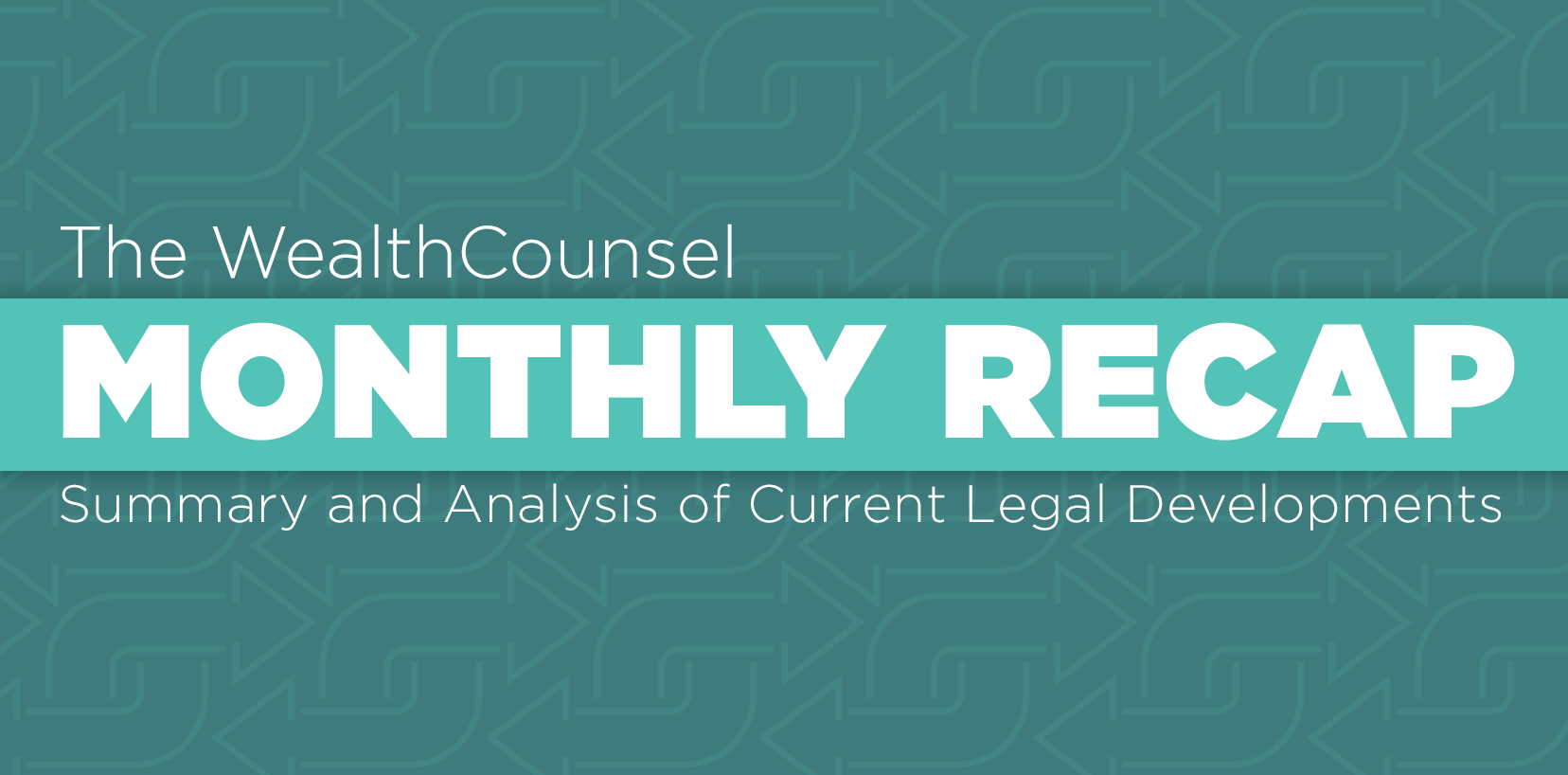
A client’s intentions in preparing an estate plan are as unique as that individual. Even so, some of the most common reasons for estate planning include the desire to
- control the property and accounts being left behind;
- provide for a spouse, child, or other beneficiaries;
- avoid confusion and family conflict; and
- name the executor, trustee, trust protector, or guardian for minors who will make decisions and distributions according to the instructions in the estate planning documents.
Clients also engage in estate planning to minimize the impact of taxes. While estate and gift taxes may first come to mind, income and capital gains taxes also play a role in estate planning decisions. Although tax advisors and accountants may be called upon to opine and collaborate on tax compliance and planning, as a matter of course, estate planning attorneys should be able to educate and advise their clients on the basics of federal estate and gift tax (as well as state-level transfer taxes where applicable) and the general tax consequences of the estate planning decisions and transactions they seek to make.
In the current federal estate and gift tax environment, the majority of estates will not have an estate tax consequence due to a substantial exemption amount. Nevertheless, estate planning attorneys who have a solid understanding of estate, gift, and income taxes will be better prepared to serve their clients.
New to estate planning or just looking to refresh your knowledge on federal tax concepts? Check out our twelve-part Tax Intensive 2020 course here.
1. You will be a better client counselor.
To educate and counsel their clients, estate planners must understand and keep abreast of various tax considerations including, but not limited to, individual income, capital gains, gift, estate, and generation-skipping transfer (GST) taxes. In addition, estate planning attorneys may need to become well-versed in various business tax concepts when a client is a business owner or holds an interest in a closely-held business. Estate planning attorneys can help clients devise a better overall plan when issues under the federal tax code are addressed.
Some important federal tax concepts to keep in mind include the following:
- Individual income tax and estate planning. In 2020, there are seven tax brackets for ordinary income and the tax rates range from 10 percent to 37 percent. Tax brackets depend on filing status: single, married filing jointly, married filing separately, and head of household. Estate planners should discuss with the client the client’s current and near-future income tax bracket to get a solid view of how the client’s potential income tax liability can affect the value of the client’s overall estate. When applicable to the client’s planning desires to transfer certain assets to specific beneficiaries, estate planners should also seek to understand the possible income tax brackets of the beneficiaries to better project how income taxes might impact the gift or legacy.
- Capital gains tax and estate planning. A capital gains tax is imposed on the difference between the sale price of the asset—referred to as the asset basis—and its original purchase price. Long-term capital gains for property or accounts held longer than one year are generally taxed at the 15 percent or 20 percent rate, depending on the taxpayer’s tax bracket. Asset basis travels with a gift. The recipient’s gift may receive a low basis that could result in a substantial capital gains tax when the gifted property is sold.
- Gift tax and estate planning. Making gifts of assets during a lifetime not only removes the gift from the client’s estate (reducing the amount of assets that could be subject to estate tax at death), but also moves the future appreciation of those assets to the next generation or beneficiary. There are caveats to making significant gifts during the client’s lifetime, however; among them are loss of control over the property or account; the transfer of low basis with the gift to the donee, possibly resulting in capital gains tax for the donee; and possible “look back” consequences if the assets that were given away as a gift could be reached by a creditor of either the donor or the donee. It is important to be aware of all of the potential circumstances and gift tax consequences when counseling a client in estate planning.
- Estate Tax. The Tax Cuts and Jobs Act of 2017 (TCJA) amended Internal Revenue Code (Code) Section 2010 (c)(3) to provide that, for decedents dying and gifts made after December 31, 2017, and before January 1, 2026, the federal basic exclusion amount (BEA) was doubled from $5 million to $10 million, adjusted for inflation. In 2020, the BEA amount is $11,580,000. As of January 1, 2026, the BEA reverts to $5 million, adjusted for inflation, unless Congress further acts.
Most estates will not owe federal estate tax in the current estate tax environment because the total estate is less than the exclusion amount. Even if no estate tax is owed, estate planners should still advise their clients on the principles of federal estate tax.
- Generation-Skipping Transfer Tax. GST tax is a tax on the transfer of property by gift or by inheritance to a person who is at least a generation below (or at least 37 ½ years younger) than the donor. Typically, the donor is a grandparent and the recipient (known as the skip person pursuant to Code Section 2613) is a grandchild. The GST tax exemption amount, which can be applied to generation-skipping transfers including those through a trust, is $11,580,000 in 2020. Any gifts over the GST exemption amount are subject to a 40 percent tax rate in 2020. Estate planning attorneys should understand the workings of the GST tax and the application of the GST tax exemption in order to advise clients on optimal planning.
2. You’ll be a better team player.
Planning can be a team endeavor for the benefit of the client who seeks multifaceted advice. Financial advisors help clients plan their financial futures. Accountants manage financial information and transactions, and advise clients on compliance and reporting. Insurance professionals help clients manage risk and provide liquidity for their families or businesses in the event of death or catastrophe.
Estate planning attorneys, with their clients’ consents, often collaborate with various financial services professionals to help find the best solutions for their clients’ needs. Understanding tax concepts helps estate planning attorneys communicate with other professional advisors since income tax, gift tax, and estate tax issues often arise when discussing financial planning and transactions.
The client’s portfolio of property, accounts, and cash that is being built, managed, and protected by financial advisors, accountants, and insurance professionals is part of the client’s gross estate for estate tax purposes. Code Section 2031 defines the gross estate as the value of all property, real or personal, tangible or intangible, that is owned by a decedent or in which the decedent had an interest in at the time of death. Estate planning attorneys frequently speak with the client’s other trusted advisors about what assets may be included in the client’s gross estate (and therefore subject to estate tax), including the following:
- Real estate
- Stocks and bonds
- Cash and accounts
- Annuities
- Insurance on the decedent’s life
- Tangible personal property
- Jointly-owned property
- Business interests
Generally, assets are included in the deceased person’s gross estate at their fair market value on the date of the decedent's death, as per Code Section 2033, and are potentially subject to estate tax. Estate planning attorneys regularly communicate with other financial advisors at the estate planning and administration stages about the type, value, and title of assets owned by the client, as well as the tax consequences of owning, selling, gifting, or transferring such assets during lifetime or at death. A solid understanding of the tax concepts involved during these transactions is important for estate planning attorneys as they work with other professionals to plan and administer estates and trusts.
3. You will be better able to help your clients adapt to change.
Looking backward helps an estate planning attorney look forward. The tax code is always changing; reviewing the highlights of recent federal tax legislative history as far back as two decades or more can help estate planners understand how and why federal tax concepts have developed, allowing attorneys to better anticipate future changes that may affect estate planning. The power of income, estate, and gift tax perspective can make estate planning attorneys stronger, more knowledgeable advisors for their estate planning clients.
Whether you are new to estate planning or looking for a refresher, get a comprehensive overview of the Internal Revenue Code and its practical applications for estate planning in our twelve-part Tax Intensive 2020 course. Presenters will lead you through selected sections of the Internal Revenue Code relevant to the planning and administration of estates and trusts and the creation and management of business entities in estate planning. Learn more about the course here.



